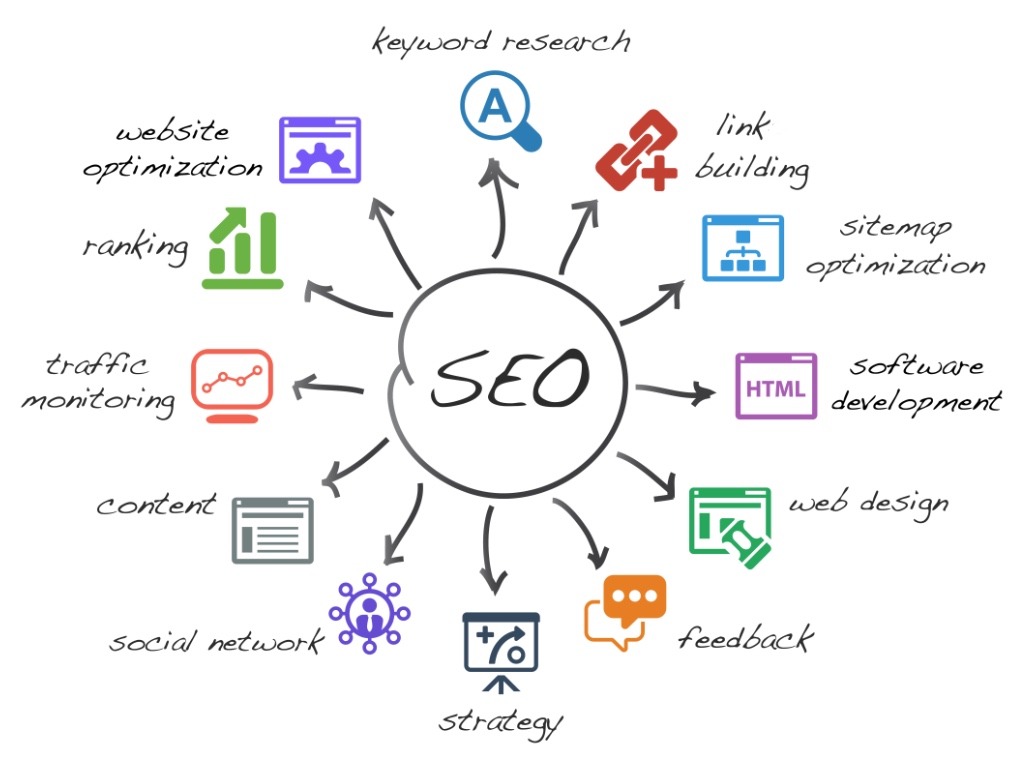SEO Consultant London Ontario: Off-page SEO strategies explained
Discovering the Scope of SEO: Insights From a SEO Professional on Ideal Practices
In the electronic landscape, the significance of search engine optimization can not be overemphasized. It includes various methods that enhance on the internet visibility and drive organic website traffic. A search engine optimization expert highlights crucial methods, from keyword research to on-page and off-page strategies. As companies navigate these complexities, understanding the nuances of technical SEO comes to be vital. The trip does not finish there; developing fads require constant adaptation. What critical understandings can propel organizations towards sustained success?
Recognizing SEO Principles
Several people acknowledge the relevance of search engine optimization (SEARCH ENGINE OPTIMIZATION), a clear understanding of its basics stays crucial for effective application. Search engine optimization incorporates a collection of approaches and techniques focused on boosting a site's visibility on online search engine results web pages (SERPs) The main elements of search engine optimization include on-page optimization, off-page optimization, and technical search engine optimization.
On-page optimization concentrates on boosting specific websites through pertinent material, meta tags, and user-friendly style. Off-page optimization entails structure backlinks from reliable websites to enhance reputation and authority. Technical SEO guarantees that a website comes and indexable by search engines, addressing facets such as website speed, mobile-friendliness, and organized information.
Mastering these foundational components furnishes individuals with the devices essential to create successful SEO projects, inevitably resulting in enhanced website web traffic and interaction. Recognizing these principles is essential for any person intending to navigate the developing landscape of digital advertising effectively.
The Significance of Keyword Phrase Research
Keyword phrase research is an essential step in any successful SEO approach, often considered the foundation of reliable web content creation. This procedure includes determining the terms and expressions that prospective clients utilize when looking for product and services online. By understanding these search phrases, marketing professionals can tailor their web content to align with individual intent, improving presence in online search engine results.

On-Page Search Engine Optimization Techniques
On-page search engine optimization strategies are essential for optimizing individual website to rank higher and gain more appropriate web traffic. These strategies concentrate on different components within the webpage itself. Key elements consist of meta tags, such as title tags and meta descriptions, which should be succinct and keyword-rich to improve internet search engine presence.
Furthermore, the proper usage of header tags (H1, H2, H3) aids framework web content, making it easier for customers and online search engine to recognize the power structure of info. Maximizing photos through alt tags is also critical, as it enhances ease of access and provides context for internet search engine.

Off-Page SEO Methods
While on-page search engine optimization concentrates on components within a site, off-page SEO methods are important for improving a website's authority and presence via outside variables. These techniques primarily entail structure backlinks, which function as recommendations from various other web sites, signaling trustworthiness to internet search engine. High-grade back links from reputable resources are specifically valuable, as they can greatly boost a site's position in online search engine results.
Furthermore, off-page SEO incorporates social media engagement and material marketing. SEO Services London Ontario. Sharing web content on social platforms assists in reaching a more comprehensive target market and can drive web traffic back to the internet site. Influencer cooperations can also intensify reach and reputation
Additionally, online reputation management contributes in off-page search engine optimization; favorable reviews and reviews improve a site's viewed dependability. To conclude, a comprehensive off-page SEO approach is vital for developing authority, boosting presence, and eventually driving natural traffic to a web site.
Technical Search Engine Optimization Basics
Technical search engine optimization Basics play an essential function in boosting a website's performance and individual experience. Secret aspects such as site speed optimization, mobile-friendliness, and a well-structured URL system greatly effect search engine positions. Understanding and executing these aspects is critical for any efficient SEO approach.
Website Rate Optimization
Site speed optimization plays a vital duty in enhancing customer experience and enhancing internet search engine rankings, as faster loading times can significantly reduce bounce prices. An internet site that loads rapidly encourages individuals to stay longer, ultimately raising involvement and conversion prices. Different variables influence website speed, including picture sizes, web server feedback times, and the efficiency of code. Carrying out strategies such as picture compression, browser caching, and minimizing HTTP demands can substantially improve performance. In addition, utilizing material distribution networks (CDNs) assists disperse content a lot more effectively throughout geographical areas. Checking site speed via tools like Google PageSpeed Insights can supply valuable insights and workable suggestions for further enhancements. Focusing on website speed is an essential element of technological search engine optimization that can bring about considerable advantages for on-line exposure.
Mobile-Friendliness Relevance
Just how important is mobile-friendliness in today's electronic landscape? Mobile-friendliness has come to be an essential consider search engine optimization, reflecting the expanding fad of customers accessing internet sites using mobile phones. Browse engines, specifically Google, focus on mobile-responsive styles in their ranking formulas, making it critical for businesses to adjust (SEO Consultant London Ontario). A mobile-friendly website improves individual experience by giving simple navigation, quicker loading times, and readable material on smaller sized screens. This adjustment not just lowers bounce rates but likewise boosts involvement and conversion rates. As even more customers depend on mobile for on the internet buying and information, ignoring mobile optimization can severely influence an organization's exposure and competition. Companies should prioritize mobile-friendliness to thrive in a progressively mobile-centric world.
URL Structure Best Practices
Commonly forgotten, a well-structured URL can greatly boost a website's SEO performance. SEO experts highlight the significance of simplicity and readability in URL layout. A clear link structure not just aids online search engine comprehend the material of a page yet also improves customer experience. Ideal methods recommend making use of hyphens to different words, maintaining URLs succinct, and consisting of pertinent search phrases without keyword padding. Furthermore, straight from the source it is recommended to stay clear of intricate specifications and excessive subdirectories. Consistent URL structures throughout a website add to much better indexing and can favorably influence positions. By sticking to these guidelines, webmasters can create URLs that are both user-friendly and maximized for internet search engine, inevitably driving even more natural traffic to their sites.
Gauging Search Engine Optimization Success With Analytics
Gauging search engine optimization success calls for a clear understanding of vital efficiency indicators (KPIs) that reflect website performance. Examining traffic resources is important for recognizing which networks contribute most to organic growth. By concentrating on these metrics, marketing experts can make informed choices to boost their search engine optimization approaches.
Trick Efficiency Indicators
Trick Efficiency Indicators (KPIs) act as important metrics for evaluating the performance of search engine optimization approaches. These signs provide a quantifiable procedure of success, allowing businesses to examine their on-line exposure, website traffic, and interaction. Typical KPIs consist of natural web traffic, conversion rates, keyword positions, and bounce rates. By keeping an eye on these metrics, business can determine toughness and weak points within their search engine optimization projects. An increase in natural web traffic suggests boosted search engine positions, while high bounce rates may show material importance problems. Furthermore, tracking these KPIs in time makes it possible for services to make data-driven decisions, enhancing click here for more their methods for much better efficiency. Eventually, a well-defined set of KPIs is important for comprehending the impact of SEO initiatives and guiding future campaigns.
Evaluating Web Traffic Sources
Exactly how can businesses efficiently understand the effect of their SEO initiatives? Assessing web traffic resources is vital for assessing the success of SEO strategies. By utilizing analytics tools, services can identify where their internet site visitors stem, whether from natural search, social media, recommendations, or paid ads. This data allows them to establish which networks are driving the most traffic and conversions. Furthermore, segmenting web traffic sources helps in recognizing individual habits, making it possible for businesses to tailor their content and marketing methods appropriately. Consistently checking these metrics not just exposes the effectiveness of present SEO techniques but also highlights locations for renovation. Ultimately, an extensive analysis of web traffic sources supplies actionable insights that can lead to enhanced on-line presence and development.

Remaining Ahead: Future Trends in Search Engine Optimization
As the digital landscape progresses, staying notified regarding future trends in SEO comes to be crucial for companies seeking to keep their competitive edge. Professionals predict that fabricated intelligence (AI) will play a significant duty fit SEO methods. This includes the utilization of AI-driven devices for keyword evaluation and web content optimization, improving customer experience with individualized referrals.
Voice search is additionally expected to get importance, triggering services to rethink their keyword methods and concentrate on natural language processing. In addition, the significance of mobile-first indexing remains to rise, necessitating responsive design and fast-loading pages.
The assimilation of video web content is anticipated to increase, as aesthetic media catches customer engagement much more successfully. Finally, focus on honest search engine optimization techniques, such as transparency and user personal privacy, will likely come to be a crucial aspect in acquiring customer trust. By adjusting to these trends, companies can place themselves for continual success in the ever-changing search engine optimization landscape.
Regularly Asked Inquiries
How much time Does It Take to See Search Engine Optimization Outcomes?
The inquiry of the length of time it takes to see search engine optimization results is complex. Typically, noticeable changes may take place within three to 6 months, however variables like competition, technique, and internet site age can considerably influence timelines.
Can Social Media Effect SEO Rankings?
The question of social media sites's effect on SEO positions commonly occurs (SEO Expert London Ontario). While social media does not directly influence rankings, raised interaction and traffic from these systems can boost presence and indirectly go to my blog sustain search engine optimization efforts
What Role Does Content Quality Play in SEO?
Content top quality greatly affects SEO rankings. Top quality, relevant material engages users, minimizes bounce prices, and motivates sharing. Look engines prefer internet sites that regularly supply important info, inevitably boosting visibility and trustworthiness in search results page.
Is SEO a One-Time Initiative or Ongoing?
The question of whether search engine optimization is an one-time effort or ongoing reveals that effective SEO requires continual optimization. Algorithms change, competition evolves, and fresh content is important to maintain visibility and relevance in search results page.
Exactly how Frequently Should I Update My Website for SEO?
The frequency of internet site updates for search engine optimization relies on aspects like web content significance, market patterns, and competitors. Regular updates, ideally monthly or quarterly, can improve rankings and keep the website aligned with individual assumptions.